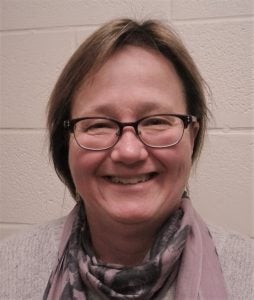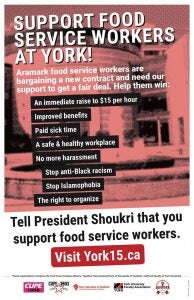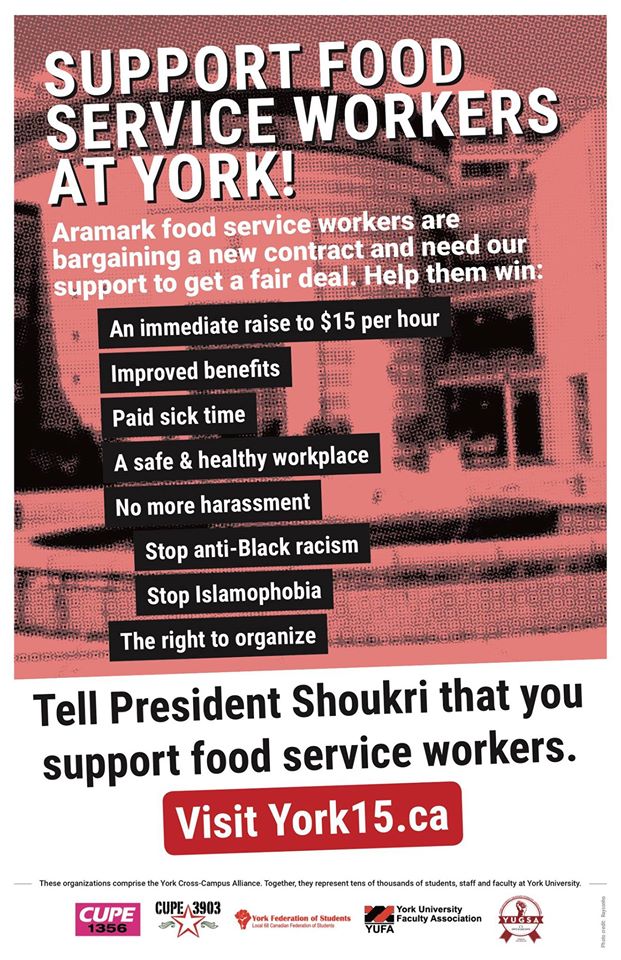The campaigning period for the Grievance Officer by-election and the Bargaining Team elections for Units 1, 2, and 3 began on January 19. Voting will begin during the GMM on February 8 and continue until February 15. Candidates may continue campaigning while voting is underway, as long as they maintain a minimum distance of 20 meters from any polling station. voting for the Grievance Officer position is open to all four units.
Polling stations will be open at the following locations:
- Keele Campus polling station (9 am – 5 pm): Vari Hall link (between Vari Hall and Central Square)
- Glendon Campus polling station (11 am – 3 pm): Outside the Cafeteria (across from York Hall, Room 170)
Get to know the candidates below:
Unit 1 Bargaining Team Nominations
Chelsea Bauer
 My name is Chelsea Bauer and I’m asking for your vote to be on the Unit 1 bargaining team. A committed member of CUPE 3903 for five years, I have become increasingly active since serving as a picket captain during the 2015 strike by working on several committees, participating in TFAC, attending almost all General Members’ Meetings, and being a trusted Departmental Steward for TAs and GAs in the Department of History. This active participation has allowed me to develop a deep appreciation of our collective strength, and to also understand where and how we need to improve. I plan on being a member-driven representative on the bargaining team, and know that our bargaining power depends heavily on our ability to mobilize and listen to the rank-and-file.
My name is Chelsea Bauer and I’m asking for your vote to be on the Unit 1 bargaining team. A committed member of CUPE 3903 for five years, I have become increasingly active since serving as a picket captain during the 2015 strike by working on several committees, participating in TFAC, attending almost all General Members’ Meetings, and being a trusted Departmental Steward for TAs and GAs in the Department of History. This active participation has allowed me to develop a deep appreciation of our collective strength, and to also understand where and how we need to improve. I plan on being a member-driven representative on the bargaining team, and know that our bargaining power depends heavily on our ability to mobilize and listen to the rank-and-file.
Being a Departmental Steward for several years has given me a practical understanding of how our collective agreement functions and directly impacts our experiences at York University. As Departmental Steward, I’ve helped represent several members in filing a variety of grievances and I have worked directly with members negatively affected by the administration’s constant reinterpretation of our collective agreement over the last few years. I also helped organize and mobilize international students in the Department of History to support the tuition indexation grievance our union won last year. As my department’s Graduate Student Association co-chair, I have also used my own experience as a former member of Unit 3 to articulate, in several meetings with faculty and administrators, the negative impact the fellowship model has on incoming students and have challenged the administration to address the gaps in services and supports caused by the removal of union membership.
The importance of our collective agreement to both graduate students at York and the larger sector of precariously employed university educators cannot be understated – it sets the bar for our sector. As a member of the bargaining team I will take the responsibility of protecting and further improving our contracts very seriously, and look forward to working closely with other members of Unit 1 to establish our bargaining priorities. I believe that by working together in a transparent and inclusive manner we can empower ourselves to protect the gains we’ve made while also forcing the administration to address its continued mistreatment of graduate student workers.
Brendan Bruce
No statement available at this time.
Tracy Mack
 Bargaining is the most important job of a local. I am running for the bargaining team, Unit 1, with one main goal in mind: to improve the livelihoods of graduate employees. As a former bargaining team member during our last round of bargaining and strike, I have considerable experience with collective bargaining and our collective agreement. This involvement also taught me an immense amount about labour relations, union activism, and the heightened ability that our collective membership has when we stand in solidarity and fight for our rights. Although I know the bargaining process won’t be easy, I have the experience, I am ready, and I believe that my familiarity with the employer’s tactics will help the team bargain more successfully.
Bargaining is the most important job of a local. I am running for the bargaining team, Unit 1, with one main goal in mind: to improve the livelihoods of graduate employees. As a former bargaining team member during our last round of bargaining and strike, I have considerable experience with collective bargaining and our collective agreement. This involvement also taught me an immense amount about labour relations, union activism, and the heightened ability that our collective membership has when we stand in solidarity and fight for our rights. Although I know the bargaining process won’t be easy, I have the experience, I am ready, and I believe that my familiarity with the employer’s tactics will help the team bargain more successfully.
Since my participation as a bargaining team member in the last round of bargaining, I have continuously been involved with the union. During this past year, the membership has voted me onto four union committees. In two of those committees, I have been actively preparing for bargaining. My participation on the archives committee (we have been going through years of documents to prepare substantive reports highlighting the areas in need of amelioration) has contributed to my skills as a bargaining team member. Three recommendations that the archive committee will be putting forth to the bargaining committee in regards to the Ways & Means fund is to 1) consider expanding the funds given the swelling volume of applicants; 2) consider a fund to make students permanent residents and; 3) consider a fund for military exemption fund (given our anti-war platform and ethical investment policies of the university) to keep our members in the classrooms and not on a battlefield. On the accessibility committee, I have been part of a team that has begun reaching out to the disability community at York, with the intent of producing bargaining proposals by people with disabilities and therefore reflective of their needs.
Winning a contract is not enough for me. To advance the interests of all graduate employees and stand in defence of high quality higher education during this period of corporatization of higher education, we need to have strong voices on the bargaining committee to achieve more than merely having a band aid applied to a gushing heart wound to stop the bleeding.
Lina Nasr Ali
I am a third year PhD student in the department of Political Science at York University. As a member of this local for the past 5 years —both as unit three and now one —I have been present and active throughout my time in the union, including my involvement in the 2015 Strike. I have past experience with union organizing (both within CUPE 3903 and through solidarity unionism) but I hope to expand my knowledge/practice of it, and for me this includes an understanding of the bargaining process.
Justin Panos
Negotiating is about power. Our power lies in the knowledge, capacities and number of members. Behind my approach to the negotiating process is majority participation. Under Canadian law, the negotiating table is the only place a worker sits across from the boss as an equal. Its therefore imperative to survey the members, organize them into committees and bring them to negotiations. The negotiating team should trust the membership, stay close to them, communicate effectively, explain the risks honestly, and build power to win a great contract.
In face-to-face conversations with dozens of members from a variety of departments—from mechanical engineering to communications, social science to biology– these are the issues that were identified to me:
- Strengthen tuition indexation;
- Enhance the priority pool language;
- Reduce class sizes;
- Stop out of pocket payments for science students;
- Expand dental benefits;
- Expand the Ways and Means Fund;
My first goal if elected will be to conduct a negotiating survey on a majority of members in each department to identifed key needs and demands required to make the classroom better for teachers and students. Once issues are identified, my second step will be to organize the members into article committees to help draft, refine and strengthen the language of our contract. These committees are integral to enforcing the contract once we win.
I have extensive experience with negotiations and contract campaigns. In the summer of 2016 I helped 8000 nurses in Philadelphia win top-level contracts against five big hospital systems. Our strategy was to get every member to the negotiating room at least once. It was a huge success.
Another asset I could bring to the negotiating team is my capacity to conduct a financial analysis of the employer’s income statements, bonds, cash flow and annual reports in order to assess their ability to pay. Employers creatively hide and disguise the ability to pay and deploy a variety of negotiating tactics to instill futility. My training includes countering these tactics.
Most importantly, my experience working within Canadian and American nurse associations has taught me the importance of equity and accessibility in contract campaigns. Building an effective organization to win a contract will require recognizing and rectifying power imbalances within the union.
Vote for Justin Panos to build actual power through the negotiating process.
top
Unit 2 Bargaining Team Nominations
Murray Cooke
 I’ve been a member of Unit 2 since 2003, teaching mainly in Political Science. Like most members, I have no real job security. Despite my mid-level seniority, in 2015-16 I didn’t get any work at York at all. This needs to change for all of us!
I’ve been a member of Unit 2 since 2003, teaching mainly in Political Science. Like most members, I have no real job security. Despite my mid-level seniority, in 2015-16 I didn’t get any work at York at all. This needs to change for all of us!
I’m an active member of CUPE 3903. As the Chief Steward Unit 2 from 2014-2016, I was a member of the Grievance Committee and, during the last round of negotiations, I often attended bargaining meetings.
Thanks to past bargaining rounds, and past struggles, we have one of the best collective agreements for Contract Faculty around. But we know it’s insufficient and that York attempts to undermine it at every opportunity. As a member of the Bargaining Team, I will work with other members to improve our collective agreement.
To obtain a stronger Unit 2 collective agreement, we need to:
- involve as many Unit 2 members as possible in developing our bargaining proposals,
- ensure our diverse Unit 2 membership is reflected in our bargaining priorities,
- engage in open and transparent bargaining,
- ensure that our Unit 2 Bargaining Team is accountable to Unit 2 members.
We’re stronger when we explicitly address our diversity. Expanding and strengthening our equity provisions will help, as will bargaining on behalf of all Unit 2 members regardless of their seniority, academic qualifications, teaching position, campus, department or faculty.
Unit 2 bargaining proposals will be determined by the broad Unit 2 membership, not by members of the Bargaining Team. Still, some issues clearly demand attention:
- Postings and Appointments: The process needs fixing to limit employer manipulation. Timelines need to be strengthened. Late appointments require additional compensation. Incumbency should be lengthened to ensure that members remain considered qualified to teach courses that they’ve previously taught.
- Continuing Sessional Standing Program (CSSP): We need to listen to members’ experiences with the CSSP and improve it. All members of the pool should be eligible for compensation when their workload declines. That compensation should be increased.
- Long Service Teaching Appointments and Conversions: We need 15 LSTAs and Conversions per year, with more appointments going to candidates from all equity-seeking groups. LSTAs should be 5 years (not 3).
- Grievance Process: We need enforceable deadlines to deal with the employer’s stalling tactics.
If elected to the Bargaining Team, I will undertake that responsibility with my full commitment and enthusiasm.
For more info: murraycooke.com
Sharon L. Davidson
 I have been an engaged member of our local, participating at general membership meetings, voting in elections, serving on a number of committees including Labour-Management, Ways and Means, Professional Development, Teaching Development, Research Leave, and the Better Workplace Initiative, as well as serving on past CUPE3903 executives as Women’s Caucus Co-Chair, Internal/External Rep, and VP Unit 2.
I have been an engaged member of our local, participating at general membership meetings, voting in elections, serving on a number of committees including Labour-Management, Ways and Means, Professional Development, Teaching Development, Research Leave, and the Better Workplace Initiative, as well as serving on past CUPE3903 executives as Women’s Caucus Co-Chair, Internal/External Rep, and VP Unit 2.
My activism has given me diverse opportunities to meet with members and understand the kinds of challenges they face. While every round of bargaining is unique, I bring a knowledge of bargaining dynamics from previously serving on the BT, that I believe will be useful to getting the best possible agreement for our members. There are key issues that we need to address in this round, such as:
- Reducing class size
- Ensuring that we play a critical role in the Markham campus
- Enhancing the Continuing Sessional Standing Program to make it a meaningful means of stabilizing work for U2 members
- Improving equity provisions in our CA, particularly for our Conversion Program
- Dealing with problems with qualifications in postings
Given the opportunity to serve as a representative on the U2 BT, I will dedicate myself to addressing these issues while balancing the diverse interests of Unit 2.
Christopher Luszczek – Nomination withdrawn
No statement available at this time.
Waseem Malik
 My name is Waseem Malik and I am unit 2 member. I am running for the bargaining
My name is Waseem Malik and I am unit 2 member. I am running for the bargaining
team membership. I need your support to be part of it. My top priority, if won,
will be to negotiate, bargain and fight for our right to job security and
protect our members’ best interests. Vote me.
Thank you.
Maria Wallis
 I have been an active member of CUPE 3903 for over a decade, serving as VP Unit 2, Grievance Officer, member of the Ways and Means, the Extended Health, and the Employment Equity Committees, and the Race and Ethnic Relations LMC. Many in this local know my daughter, Rose, who has walked the picket line too. With others, I helped our members get the 2010 Equity Report (see CUPE 3903’s website). This report helped us organize and achieve the inclusion of LGBT in the Employment Equity categories, and the current focus on ‘intersectionality’. With others, I have been working in the Employment Equity Committee this year to make intersectionality a reality.
I have been an active member of CUPE 3903 for over a decade, serving as VP Unit 2, Grievance Officer, member of the Ways and Means, the Extended Health, and the Employment Equity Committees, and the Race and Ethnic Relations LMC. Many in this local know my daughter, Rose, who has walked the picket line too. With others, I helped our members get the 2010 Equity Report (see CUPE 3903’s website). This report helped us organize and achieve the inclusion of LGBT in the Employment Equity categories, and the current focus on ‘intersectionality’. With others, I have been working in the Employment Equity Committee this year to make intersectionality a reality.
I also have over 15 years of community activism in Toronto. I have organized and mobilized around poverty, racism and sexism. Rather than fall for the old ‘divide and conquer’ strategy, I have worked towards the building of coalitions and alliances. My vision? That ‘Another World is Possible.’
We have concerns to address again in this round of collective bargaining around graduate students’ and international students’ tuition fees and funding packages. We must work to ensure that higher education is accessible for all. Education is a right. A united CUPE 3903 will be the greatest challenge to our intransigent employer.
Unit 2 issues revolve around job security, and our quality of life. We have seen the undermining of seniority in our collective agreement in the employer’s interpretation of qualifications. There are major issues of accountability and transparency in our hiring procedures, in the conversion, LSTA, and CSS programs. Class sizes have grown, and tutorials have been cut. This not only erodes our work, but also intensifies it. We work more but earn less.
Unit 2 members’ needs across all seniority levels must be balanced if we are to be strong before the employer in this important round of bargaining. It will be especially critical to build opportunities for contract faculty at the new Markham campus. I will work hard to continue building and enhancing Unit 2 job security measures, as well as improving program and benefit funds. I bring considerable experience to the bargaining table. I have seen how the employer bargains and I can put my years of experience to work if you provide me with the opportunity. I ask for your support and your vote. Thank you for your consideration.
top
Grievance Officer Nominations
Kyle Belozerov (Unit 2)
 I have been an active member of the Union for roughly three years. During this period I have worked as a Postings Officer, Unit 2 listserv moderator, Ways and Means committee member, and in many other capacities. I now hope to be elected a Grievance Officer (GO), and ask for your support.
I have been an active member of the Union for roughly three years. During this period I have worked as a Postings Officer, Unit 2 listserv moderator, Ways and Means committee member, and in many other capacities. I now hope to be elected a Grievance Officer (GO), and ask for your support.
- I believe my qualifications for the GO position are:
highly detailed knowledge of all three units’ collective agreements, as well as knowledge of past practice as it relates to the grievance process.
- hands-on experience with every step of the grievance process, including mediation, gained from handling my own grievances and helping other members with theirs. Excellent working relationship with our staff and the employer representatives.
- a realistic understanding of the time investment required to do the job properly. If elected, I will immediately set up and advertise weekly office hours. I will also commit to replying to members’ emails within 24 hours.
As GO during the bargaining year, I would be working on our bargaining team (BT). If elected, I will immediately begin to prepare and analyze the summaries of our grievances for the last three years to inform bargaining about frequently violated articles. I will publicize the results of these analyses in a clear and transparent fashion to inform our members of the grievance profile and trends in the local. This information will be critical to developing effective bargaining proposals.
As a U2 BT member, I plan to focus on the following three strategic bargaining priorities:
- Securing employment opportunities for our members at the new Markham campus scheduled to open in 2020.
- Strengthening the CA language around the Continuing Sessional Standing program to ensure it matures into a program that will offer greater employment stability to contract faculty, and especially to lower-seniority members.
- Fortifying out ability to constrain arbitrarily inflation of job qualifications. In the last few years, numerous members lost their employment due to this problem. I will work to curb this alarming trend, as well as the problem of growing class sizes.
I am committed to working very closely with the U1 and U3 BT members to advance their proposals. I will strive to build the inter-unit solidarity on the BT that is necessary to succeed in this critical round of bargaining. I would like to thank you for considering to support my nomination.
Elizabeth Brulé (Unit 2)
I am a long time CUPE member having served in various capacities in the union over the years. I first served as one of the founders and then co-chair of the local’s women’s caucus, (what is now TFAC).
Later I was a member of the bargaining team, and served on the local’s executive committee as grievance officer. I have also been the postings officer on numerous occasions and participated in our last strike on the communications committee producing pamphlets for the lines, providing copy editing for the newspaper publication and working closely with my comrades in trying to get the most politically progressive message out into the mainstream media.
While I am presently a Unit II member, I am well aware of the issues facing all our units and will work hard to represent your concerns as grievance officer and as a member of our future bargaining team. The number of cuts to our graduate assistant positions has impacted the financial wellbeing of many incoming graduate students resulting in a loss of healthcare and dental benefits, tuition indexation and child care funds. Teaching assistants are similarly impacted by a lack of commitment by the employer to minimum guaranteed funding and concerns regarding recent cuts to contract work and job security continue to contribute to the precariousness of contract worker’s lives. Of further significance are issues of gender based violence and the establishment of a survivor centric sexual assault support centre, which have been continually dismissed by York’s Sexual Violence Support Office. Also, issues regarding race and equity in hiring practices are of enduring concern. These issues need to be addressed in this next round of negotiations and I am committed to working on in the position of grievance officer and hope to bring them forward as we move into a new bargaining year.
I hope to have your support.
top









